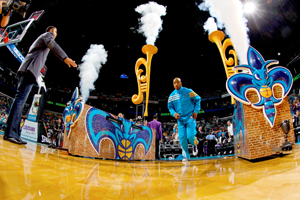At a time when cable operators are actively trying to pick up local sports rights, Cox Communications is taking the opposite approach. The cable operator essentially has decided to get out of the sports rights business, opting not to compete with Fox Sports for the rights to the New Orleans Hornets in exchange for a long-term carriage deal with Fox’s regional sports network, according to multiple sources.
The decision mirrors what the cable operator did in San Diego with the Padres, as Cox decided to strip its local channel in New Orleans, Cox Sports Television, of sports and pull out of bidding for the Hornets rights.
 |
Hornets games on Cox Sports Television were
available to only 37 percent of the New Orleans DMA.
Photo by: NBAE / GETTY IMAGES
|
As a result, Fox was the only serious bidder for the Hornets rights; there was no bidding war, sources said. Sources peg the rights fee in the low to mid eight figures, comparable to the amount Fox pays for the Bobcats’ rights in Charlotte.
Fox has not decided which of its RSNs will carry the Hornets, but it appears likely that Fox will launch a New Orleans feed off of FS Southwest, which also holds the rights to the Texas Rangers, Dallas Stars, Big 12 and Conference USA. After securing Oklahoma City Thunder games, Fox launched an FS Oklahoma feed off of FS Southwest.
Cox followed similar strategies in San Diego, where it operated an RSN, and Oklahoma City, where it opted not to bid for the Thunder when the team moved into the market in 2008. In both cases, Cox dropped out of the bidding early, leaving Fox as the sole serious bidder for the rights. Cox’s Channel 4 San Diego is still operating with locally produced programming.
A cable industry source familiar with the cable operator’s strategy said that Cox was able to sign Fox’s RSNs to long-term carriage deals in each of these markets, predicated on Fox being able to secure the rights at a certain price.
For Cox, this presents a way for the cable operator to keep sports rights increases in check without bidding up rights and launching RSNs.
Using a loophole in federal regulations, Cox did not make its RSNs available to its satellite and telecommunications competitors, which hurt the team’s distribution in both markets. Recently, federal regulators abolished the loophole, but Cox still wasn’t able to reach a carriage deal with DirecTV.
Hornets games on Cox Sports Television were available to only 37 percent of the New Orleans DMA. It had no deal with DirecTV (which controls 25 percent of the market), and Charter (which holds 21 percent of the market) charged subscribers an extra $5 for access to Hornets games.
Fox’s pitch was that it could secure better distribution because it has long-standing relationships with distributors that Cox does not have. Most of Fox’s RSNs have full distribution, though the one it just launched in San Diego has not been able to work out a carriage deal with one of the market’s biggest cable operators, Time Warner Cable.
Cox’s moves have surprised cable industry veterans, coming at a time when the two biggest cable operators are making big bets on local sports rights in markets where they operate cable systems.
Comcast and Time Warner Cable, in particular, have been buying up rights to local teams and launching RSNs to support them.
As opposed to Cox, Comcast and Time Warner believe they are better able to manage their sports costs if they control them — even if they are bidding up the cost of sports rights.
Comcast’s stable of Comcast SportsNet RSNs is one of the most profitable parts of the company. It is in the process of launching a new RSN in Houston, having outbid Fox for the rights to the Astros (starting in 2013) and Rockets (starting next season). The teams will own a majority of the RSN.
Time Warner Cable is a recent entrant into the sports rights business. It is launching two RSNs in Los Angeles — one in English, one in Spanish — with programming from the NBA’s Lakers and MLS’s Galaxy.




